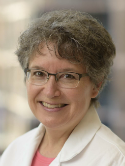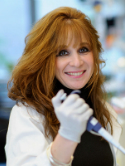Genetic alterations of the p14ARF-hdm2-p53 regulatory pathway in breast carcinoma Journal Article
| Authors: | Ho, G. H.; Calvano, J. E.; Bisogna, M.; Abouezzi, Z.; Borgen, P. I.; Cordon-Cardo, C.; Zee, K. J. V. |
| Article Title: | Genetic alterations of the p14ARF-hdm2-p53 regulatory pathway in breast carcinoma |
| Abstract: | TP53 is the most commonly mutated tumor suppressor gene in human cancers. The amplification and overexpression of HDM2 plays a role in tumorigenesis via inactivation of p53-dependent cell cycle arrest, p14ARF, an alternate transcript of the INK4A tumor suppressor locus, prevents hdm2-induced transcriptional silencing of p53 by binding hdm2. The role of this p14ARF-hdm2-p53 regulatory pathway in breast carcinoma is unknown. We hypothesized that p14ARF mutations and HDM2 gene amplification may be alternative mechanisms of p53 inactivation in breast cancer. Mutational analysis of TP53 (exons 5-9) and exon 1 β of p14ARF was performed by PCR-SSCP and putative mutations were confirmed by sequencing. p14ARF mRNA expression was evaluated by RT-PCR and the presence of HDM2 gene amplification by differential PCR. Among the cell lines, 7/14 (50%) harbored TP53 mutations and 2/14 (14%) had a deletion of p14ARF exon 1 β with no detectable p14ARF mRNA. None demonstrated HDM2 gene amplification. TP53 mutations were identified in 7/36 (19%) breast tumors and HDM2 amplification in 2/30 (7%) tumors. All the tumors contained an intact p14ARF exon 1 β with corresponding expression of the mRNA. Alterations in the various components of this regulatory pathway were identified in nine (64%) cell lines and 25% of the 36 breast cancers with TP53 mutation being the predominant aberration. Although p14ARF mutations and HDM2 gene amplification appear to be uncommon events in breast carcinoma, deregulation of this pathway may occur via alternative mechanisms in breast carcinogenesis. |
| Keywords: | human tissue; oncoprotein; gene mutation; human cell; sequence analysis; exon; gene deletion; genetics; exons; proto-oncogene proteins; proteins; cell cycle; gene overexpression; reverse transcription polymerase chain reaction; breast cancer; gene amplification; nuclear protein; protein; protein binding; gene locus; pathology; tumor cells, cultured; breast neoplasms; protein p53; cell transformation, neoplastic; nuclear proteins; gene expression regulation; tumor suppressor gene; gene expression regulation, neoplastic; transcription regulation; cell culture; messenger rna; reverse transcriptase polymerase chain reaction; rna, messenger; cell transformation; nucleotide sequence; breast tumor; breast carcinoma; carcinoma; gene inactivation; dna mutational analysis; tumor suppressor protein p14arf; cell cycle regulation; breast carcinogenesis; protein mdm2; proto-oncogene proteins c-mdm2; mdm2 protein, human; genes, p53; tp53; hdm2; p14arf; protein p14arf; humans; human; female; priority journal; article |
| Journal Title: | Breast Cancer Research and Treatment |
| Volume: | 65 |
| Issue: | 3 |
| ISSN: | 0167-6806 |
| Publisher: | Springer |
| Date Published: | 2001-02-01 |
| Start Page: | 225 |
| End Page: | 232 |
| Language: | English |
| DOI: | 10.1023/a:1010686518990 |
| PUBMED: | 11336244 |
| PROVIDER: | scopus |
| DOI/URL: | |
| Notes: | Export Date: 21 May 2015 -- Source: Scopus |
Altmetric
Citation Impact
BMJ Impact Analytics
MSK Authors
-
 293
293Van Zee -
 5
5Ho -
 612
612Cordon-Cardo -
 253
253Borgen -
 18
18Calvano
Related MSK Work



